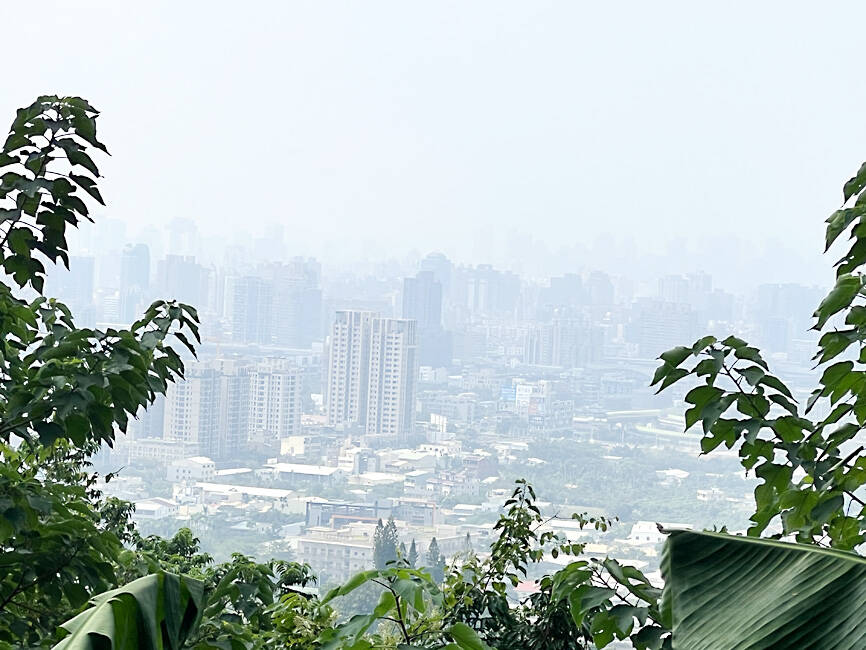The government is to raise the air quality standard in central and southern Taiwan after air pollution prevention measures enforced over the past seven years have demonstrated success in reducing the mean concentration of fine particulate matter (PM2.5) in the two regions, the Ministry of Environment said yesterday.
The ministry issued a statement after the Southern Taiwan Anti-Air Pollution Alliance held a protest in Kaohsiung yesterday.
Protesters said that they have a right to breathe clean air just as much as residents in other parts of the country and demanded that the government honor that right by stopping coal burning at the Hsinta Power Plant in Kaohsiung.

Photo: Liao Yao-tung, Taipei Times
The national mean concentration of PM2.5 had reduced from 20mg/m2 in 2016 to 13.9mg/m2 last month, while the mean concentration of PM2.5 in central and southern Taiwan had fallen from 23.7mg/m2 to 16.4mg/m2, the ministry said, citing data collected from its air quality observation stations.
Air quality in both categories showed a 30 percent improvement, the ministry said.
Phase I of the Air Pollution Prevention action plan, which has been implemented since 2020, has tackled air pollution from pollutants emitted from factories, motor vehicles, construction sites and other sources, the ministry said.
The most significant results were shown in state-run companies under the Ministry of Economic Affairs, which have introduced measures to mitigate air pollution caused by the companies, the ministry said.
Overall, pollutants emitted from Taichung Power Plant, Hsinta Power Plant, China Steel Corp and CSBC Corp have decreased by more than 50 percent, it said.
Air pollutants emitted from coal-fired Taichung and Hsinta Power Plants dropped more than 60 percent, due to a reduction in the amount of coal burned by more than 7 million tonnes and the enhanced efficiency of equipment used to curb air pollution, the ministry said.
Of the four coal-fired power generators in Hsinta Power Plant, the No. 1 generator was discharged in September and the No. 2 generator is to retire by the end of this year, while the No. 3 and No. 4 generators would become backup generators and would not be reactivated until power operating reserves drops below 8 percent, it said. Since 2016, the ministry has helped retire 70,000 old and large diesel-powered vehicles, while the number of old motorbikes has dropped from 6.98 million in 2007 to 2.66 million this year, it said.
Local governments across the country helped create 63 air quality maintenance zones to curb air pollution stemming from the transportation system, the ministry said.
Meanwhile, chromium, arsenic and cadmium in the concentration of PM2.5 decreased by 39 percent, 58 percent and 60 percent from 2017 to last year, respectively.
The Phase II Air Pollution Prevention action plan, which is to be implemented from next year to 2027, has been approved in October by the National development Council and awaits approval from the Executive Yuan.
The goal is to further reduce the mean concentration of PM2.5 in central and southern Taiwan to 15mg/m2, the ministry said.

Chinese spouse and influencer Guan Guan’s (關關) residency permit has been revoked for repeatedly posting pro-China videos that threaten national security, the National Immigration Agency confirmed today. Guan Guan has said many controversial statements in her videos posted to Douyin (抖音), including “the red flag will soon be painted all over Taiwan” and “Taiwan is an inseparable part of China,” and expressing hope for expedited reunification. The agency last year received multiple reports alleging that Guan Guan had advocated for armed reunification. After verifying the reports, the agency last month issued a notice requiring her to appear and explain her actions. Guan

GIVE AND TAKE: Blood demand continues to rise each year, while fewer young donors are available due to the nation’s falling birthrate, a doctor said Blood donors can redeem points earned from donations to obtain limited edition Formosan black bear travel mugs, the Kaohsiung Blood Center said yesterday, as it announced a goal of stocking 20,000 units of blood prior to the Lunar New Year. The last month of the lunar year is National Blood Donation Month, when local centers seek to stockpile blood for use during the Lunar New Year holiday. The blood demand in southern Taiwan — including Tainan and Kaohsiung, as well as Chiayi, Pingtung, Penghu and Taitung counties — is about 2,000 units per day, the center said. The donation campaign aims to boost

The Kaohsiung Tourism Bureau audited six hotels in an effort to prevent price gouging ahead of Korean band BTS’ concert tour in the city scheduled for Nov. 19, 21 and 22 this year. The bureau on Friday said that the audits — conducted in response to allegations of unfair pricing posted on social media — found no wrongdoing. These establishments included the local branches of Chateau de Chine, Hotel Nikko, My Humble House, and Grand Hai Lai, it said, adding that the Consumer Protection Commission would have penalized price gougers had the accusations been substantiated. The bureau said the Tourism Development Act

The Central Weather Administration (CWA) said a magnitude 4.9 earthquake that struck off the coast of eastern Taiwan yesterday was an independent event and part of a stress-adjustment process. The earthquake occurred at 4:47pm, with its epicenter at sea about 45.4km south of Yilan County Hall at a depth of 5.9km, the CWA said. The quake's intensity, which gauges the actual effects of a temblor, was highest in several townships in Yilan and neighboring Hualien County, where it measured 4 on Taiwan's seven-tier intensity scale, the CWA said. Lin Po-yu (林柏佑), a division chief at the CWA's Seismological Center, told a news conference